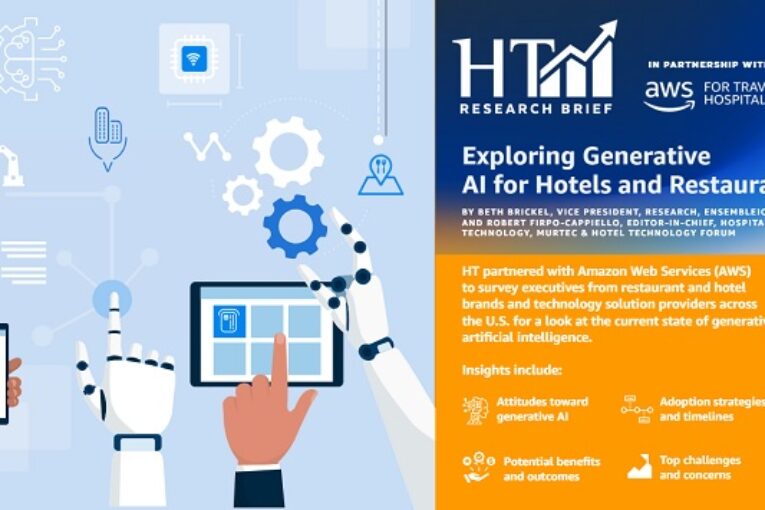
Almasalla news | Arab Tourism Portal News
The rapid evolution and deployment of generative AI has raised new expectations, new aspirations, and new questions throughout the hospitality industry.
Is generative AI the game-changer it appears to be? If so, how can we get it right? What if we get it wrong?
HT partnered with Amazon Web Services (AWS) to survey executives from restaurant and hotel brands and technology solution providers across the U.S. for a look at the current state of generative AI. Insights include:
Attitudes toward generative AI
Adoption strategies and timelines
Potential use cases and outcomes
Top challenges and concerns
Explore the full exclusive report today
The rapid evolution and deployment of tools powered by generative artificial intelligence in recent months has raised new expectations, new aspirations, and, most notably, new questions throughout the hospitality industry: Is generative AI the game-changer it appears to be? If so, how can we get it right? What if we get it wrong?
Recognizing the need to cut through the hype and deliver an authentic snapshot of generative AI’s current and projected impact on restaurants and hotels, Hospitality Technology has partnered with Amazon Web Services (AWS) and EnsembleIQ Research Solutions on our first-ever generative AI research survey. In July 2023, we conducted a survey of restaurant, hotel/motel/resort, foodservice, hotel management firm, or restaurant technology vendor/solution provider employees who have knowledge of their company’s current and future technology strategy and utilization.
We’re pleased to present data and insights from Exploring Generative AI for Hotels and Restaurants.
Attitudes Toward Generative AI
We asked survey respondents to share their attitudes and sentiments about generative AI by rating their level of agreement with a range of statements (Fig. 1, below). Our goal was to gauge their understanding of the technology, its current and potential strategic role, and potential consumer/facing and enterprise applications. A majority of respondents (60%) feel their company understands how generative AI differs from artificial intelligence and machine learning and that it is an important part of their tech strategy (50%), but less than half (46%) can agree that they are well-positioned to successfully implement solutions.
Adoption Strategies for Generative AI Technology
We asked survey respondents to identify their generative AI adoption strategies (Fig. 2, below), with five options: innovator (takes risks; among the first in the industry to adopt new technology for pilot projects); early adopter (adopts new technology before it becomes fully mainstream, but after preliminary data indicates that it is effective); mainstream adopter (adopts new technology only after substantial data is available to indicate that it is effective); and late adopter (risk-averse; unlikely to adopt new technology unless there is a very strong case made for the technology’s effectiveness and benefits); and “don’t know.”
Most respondents classify their companies as either mainstream adopters (37%) or late adopters (21%); the 17% share of innovators is driven by technology solution providers, 30% of whom identified themselves as innovators. (As a point of comparison, only 9% of hotel operators identified themselves as innovators.)
Most respondents see their companies as mainstream or late generative AI adopters, indicating a wait-and-see approach for a majority of companies and, as noted in Fig. 1, above, less than half agree they are well-positioned to successfully implement generative AI solutions.
Projected Timelines for Generative AI Implementations
We asked survey respondents to share their companies’ projected generative AI implementation timelines (Fig. 3, below). One-in-five respondents are, as of July 2023, already implementing generative AI solutions (led by 33% of solution providers and 23% of restaurant operators)), but more than half either don’t know or anticipate it requiring at least a year before they’ll be ready to activate within their company. (In Fig. 3, below, “immediately” corresponds with July 2023, “less than 6 months” reflects Q3 or Q4 2023, and so forth.)
Expected Generative AI Investment in 2024
When asked about their companies’ expected 2024 investments in generative AI, nearly 70% predict to significantly or somewhat increase spending, but there is less consensus around where that boost will be sourced from. Respondents are nearly equally split in terms of where they expect the budget increase to come from in terms of incremental (31%) or reallocation (34%). Restaurants and solution providers are more likely to expect budgets to increase significantly while hotels are more likely to expect them to increase somewhat.
Ranking the Importance of Potential Generative AI Benefits and Outcomes
With so many speculative generative AI use cases under discussion, we wanted to zero in on which potential benefits and outcomes ranked highest for the hospitality industry (Fig. 5, below). We were pleased to see respondents uphold their primary responsibility to deliver hospitality to guests with more than half (58%) reporting improvements to the customer experience as the most important outcome when considering generative AI solutions. Moreover, improvements to the customer experience was selected as a “top 3” priority by 87% of respondents.
Other mission-critical outcomes that ranked highly include automating administrative / routine tasks and decision-making analytics. We note that there’s far less confidence in generative AI to enhance hospitality workforce training, with only 17% of respondents identifying it as a “top 3” priority.
Projected Generative AI Drivers of Growth & Optimization
We asked respondents to rank the highest generative AI drivers of growth or optimization (Fig. 6, below). Our survey data suggests that as companies roll out generative AI solutions, hospitality firms are prioritizing tasks and activations that are more repetitive and easier to adapt to automated processes, such as routine tasks and customer support. We believe this signifies further hesitancy until there are proven solutions: 80% of hotels feel optimizing routine tasks will drive the most growth, compared to 50% of restaurants and 48% of solution providers.
We drilled down on some growth and optimization data points to reveal that top restaurant-specific generative AI drivers are virtual order assistant (35% of restaurant respondents) and menu / recipe development (22%). Top hotel-specific drivers are virtual concierge (51% of hotel respondents) and virtual tours / visualizations (23%).
Concerns With Generative AI
With a range of fire warnings about the potential misuse of generative AI, we knew our survey would not be complete without asking respondents for their top concerns (Fig. 7, below). Accuracy (47%) and privacy / security issues (44%) rank as the top two concerns; just over one-fourth of respondents are concerned about customer acceptance despite most rating the guest experience as the most important benefit in implementing generative AI. Hotels are more likely to cite legal or regulatory issues as a concern, while restaurants are more likely to cite lack of talent. We note that the top generative AI concerns touch on a company’s public image and relationship with customers, while there is less concern with its acceptance and operational Implementation internally.
Generative AI Action Items
Our survey data suggests that solution providers will need to demonstrate complete transparency and share indisputable data, testimonials, case studies, etc. to address accuracy and security/privacy concerns.
Increased education and knowledge-sharing will provide technology leaders with the confidence to advocate for generative AI solutions at their companies.
Examples of how generative AI can deliver positive outcomes in activities outside of routine tasks will inspire companies to pilot workforce, inventory and resource management solutions.
Source :www.hospitalitytech.com








